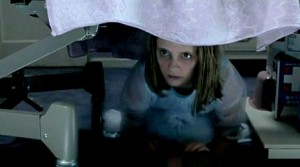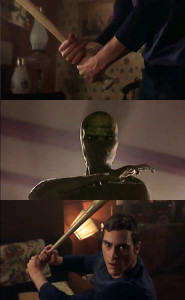The new M. Night Shyamalan movie, After Earth, is apparently quite a stinker, according to reviews. A notable feature of the film’s marketing is that the producers seem to want to downplay, or at least not highlight, the fact that Shyamalan directed it, instead focusing on the Will/Jaden Smith father/son starring duo. I don’t have much interest in seeing the movie, largely due to the absurd premise regarding evolution, but I am intrigued by how the movie’s release is sparking some retrospection about Shyamalan’s movies.
Scott Meslow at The Week had the following to say:
It’s logical — but somehow vaguely disheartening — that Shyamalan is now embarking on the career for which he was probably always more qualified: Not as a distinctive and idiosyncratic director in the vein of Alfred Hitchcock, but as a Renny Harlin or a Louis Leterrier — a director who’s just talented enough to add some verve to an otherwise undistinguished studio picture.
I don’t find it disheartening, because while I think Shyamalan’s movies (aside from The Sixth Sense and Unbreakable) have generally been sub-par, I think the primary criticism of him has missed the mark.

You knew this scene was coming, but admit it, it still scared the *&$%*!@# out of you (via kent-informationoverload.blogspot.com).
I’ll start off with something I think Shyamalan does exceedingly well, which is his direction of “jump scenes,” i.e. scenes that startle or shock you, such that you jump out of your seat. Shyamalan can broadcast, sometimes for minutes in advance, that a jump scene is coming, and the audience still jumps (or is at least meaningfully startled.) The scene with the kid and a barfing ghost (played by a young Mischa Barton) in The Sixth Sense comes to mind, although the best example is probably the “alien in the pantry” scene in Signs. He may be best suited as a director of action or suspense films written by others, as opposed to an auteur from whom everyone expects certain signatures.
Here’s where I think the criticism of Shyamalan’s movies is off-base: Meslow remarks on “Shyamalan’s over-reliance on twists,” but I don’t think he relies on twists at all. I think people came to expect twists from him after The Sixth Sense and, to a lesser extent, Unbreakable, and when no “twists” presented themselves, people assumed he just did a bad job at presenting the twist. The effort to force Shyamalan’s films into a “plot twist” model turned people against him, through no particular fault of his own. This is unfortunate, because most of his movies (at least the ones I have seen) stink for reasons unrelated to the question of plot twists. Spoiler alerts from here on out.
In movies and literature, plot twists occupy something of a continuum, from a revelation of something we knew was coming (but just didn’t know exactly what) to something we might have only seen coming if we already knew what foreshadowing events to look for. Shyamalan’s movies often take semi-unexpected turns, but I don’t really consider those “plot twists,” especially when the audience is expecting the unexpected to happen.
TVTropes.org defines a “plot twist” as:
[A] sudden, unexpected change in the fortunes or situations of the characters, setting, or plot. Plot Twists are usually based on the assumption that there is something going on that we, the readers/viewers/players, don’t know about; if we had known about it, it would hardly be surprising. When it is revealed to us, we are surprised and shocked.
For me, a true plot twist is not just something we do not expect, but something we did not know we ought to be expecting. Think of it as an “unknown unknown.”
My concept of a true plot twist comes in the 1997 movie L.A. Confidential (spoiler alert) when Dudley Smith (James Cromwell) kills Jack Vincennes (Kevin Spacey). Not only did we not see that coming, we had no idea that James Cromwell’s character was a villain. Not only did this change the course of the story moving forward, but it forced us to reevaluate everything we had already seen. We weren’t expecting a twist at all, which gave it an extra “WTF did I just see?” element. The same could be said for Kevin Spacey’s character in The Usual Suspects. George R.R. Martin’s A Song of Ice and Fire books, along with HBO’s Game of Thrones series, are full of unexpected events that reveal plot developments we didn’t know were happening at all.
The Sixth Sense has a true plot twist, in the sense that the “twist” not only alters the story, but does so in a way we had no way of expecting. We thought the film was about Cole Sear’s (Haley Joel Osment) story arc, as he comes to grips with his unusual ability and finds a way to make it both bearable and useful. In reality, though, Cole’s purpose in the story is to guide the real main character, Dr. Malcolm Crowe (Bruce Willis), to the realization and acceptance of his own death, which occurred at the very beginning of the movie. Nearly everything we paid attention to throughout the movie was misdirection, and the events that really mattered seemed like throwaway scenes (i.e. all the scenes between Crowe and his wife, when it just seemed like she refused to speak to him.) The audience did not see the ending of The Sixth Sense coming because the audience had no reason to expect that sort of ending.
Unbreakable also had a plot-twisty ending, although it was a little different. We spent the whole movie paying attention to David Drum (Bruce Willis) and his efforts to either avoid Elijah Price (Samuel L. Jackson) or figure out WTF he’s talking about. We viewed Price as the “guide” character, much like the type of character Cole Sear ended up being in The Sixth Sense. Instead, it turns out that Price is not just observing the events of Drum’s life, he is causing them to happen. This makes Price the villain, but more importantly, it means that the audience has been looking at Price wrong through the whole movie (just like we did with Cole Sear).
Those are what I consider “plot twists.” I don’t think Shyamalan ever used that sort of plot device again, but everyone expected him to. Therefore, everyone imposed that plot structure on his later films, finding faults that were not really there.
I’ve only seen three other Shyamalan films, but I doubt he included true plot twists in the ones I haven’t seen, either.

I know what you’re thinking. Wasn’t all that stuff about my baseball career an extraneous plot point? WELL THINK AGAIN, B!TCH!!! (via staticmass.net).
The Village (2004) comes closest to having this sort of plot twist, but it doesn’t, because we spent the entire movie wondering what the hell is going on. The eventual explanation (delivered by the director himself in a cameo) is surprising (well, it might be. I read a spoiler before I saw it), but I don’t consider it a “twist” in the sense of Shyamalan’s earlier films because the audience has spent the entire movie watching Strange Things happen in the woods around the village. We knew something was not right, but did not know exactly what. If he had made a movie about a completely normal village, with a seemingly mundane-but-interesting story, that actually existed in the modern era, that would have been a “twist.”
The Happening (which I might have titled Unwatchable – zing!) couldn’t even pretend to have a plot twist, in my opinion. The entire structure of the story is based on the quest to figure out “WTF is going on” in the course of surviving. The eventual revelation of why people are committing suicide en masse might have been unexpected, but that probably had more to do with the audience having high standards for movie plots than any real plot twist.
I saved Signs for last here because it was the first film Shyamalan did after The Sixth Sense and Unbreakable, and for reasons that are incomprehensible to me, it furthered people’s expectations of plot twists in his movies. Let us ignore the starship-wide plot holes for a moment (e.g. aliens that are allergic to water kidnapping organisms whose bodies are 60% water, on a planet where the atmosphere is as much as 4% water vapor), and focus on the supposed “plot twist.” We spend the whole movie watching a global alien invasion unfold from the perspective of a rural Pennsylvania farm, with a disillusioned former priest and his quirky family.
Despite the fact that we know damn well what causes crop circles (people with too much free time), the entire movie is essentially a process of heightening tension, from the initial mysterious goings-on to the aforementioned pantry scene to the final assault on the farmhouse. I have always had the darnedest time figuring out where the “plot twist” came in. A friend explained to me that the twist was that all of the seemingly-minor events earlier in the film (the daughter’s strange water habit, the son’s asthma, the uncle’s former baseball glory) happened For A Reason, and that they all came together to allow the family to survive the alien assault and completely FUBAR one of the aliens. My friend thought it was a terrible excuse for a plot twist, but I would posit that it is not a plot twist at all. It’s just a way of tying the loose ends from earlier in the movie together, albeit in a hackneyed sort of way. To call it a bad plot twist is to compound disappointment where disappointment is already available in abundance.
In conclusion, many reasons exist for criticizing the films M. Night Shyamalan has made since 2000. His apparent failure to adhere to the plot twist structure everyone demanded of him is not one of them.


Pingback: Why You Should Never Ask a Non-Practicing Lawyer for Legal Advice at a Party | Cryptic Philosopher
Pingback: Dystopias of the 1980′s: “Examination Day” | Cryptic Philosopher